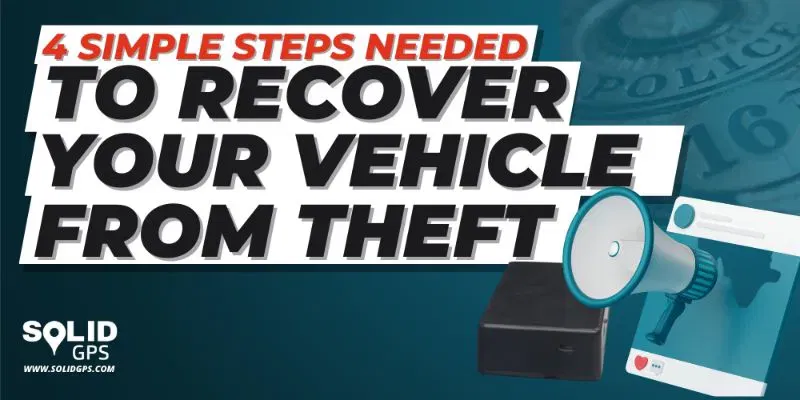Are GPS Trackers Legal in Australia?
The idea of using a GPS tracker to monitor your vehicles might seem straightforward, but when those vehicles are used by employees or other individuals, legal considerations come into play.
GPS tracking is widely used by businesses to improve efficiency, enhance security, and manage fleets—but is it legal to track someone using these devices?
The short answer is yes—but with strict conditions.
GPS tracking laws in Australia vary by state, and different regions impose different requirements.
Most states mandate consent before tracking an individual, and some impose severe penalties for failing to comply with surveillance laws.
In this article, we’ll break down Australian GPS tracking laws by state, explain key legal requirements, and highlight best practices to ensure compliance.
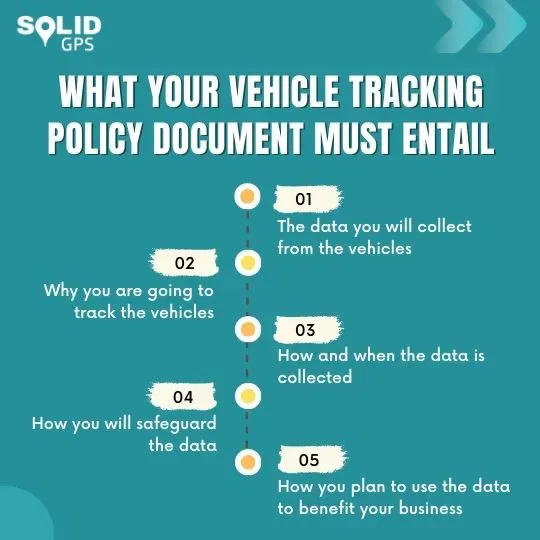
Is GPS Tracking Legal for Your Business?
Yes, businesses can legally use GPS tracking, but there are important exceptions and obligations to consider.
The Importance of Consent
Regardless of the state, one fundamental legal principle governs GPS tracking: consent.
Employers must inform employees that they are being tracked and, in many cases, obtain explicit consent.
A verbal agreement isn’t enough—businesses should obtain written consent to ensure compliance and avoid disputes. Proper documentation is key in case of legal challenges.
Express vs. Implied Consent
- Express Consent – A signed document or written agreement stating that the employee agrees to be tracked.
- Implied Consent – Consent that is assumed based on circumstances, such as an employee being made aware of tracking through policy documents and continuing to use the vehicle.
However, not all states recognise implied consent as sufficient—some require active agreement from employees.
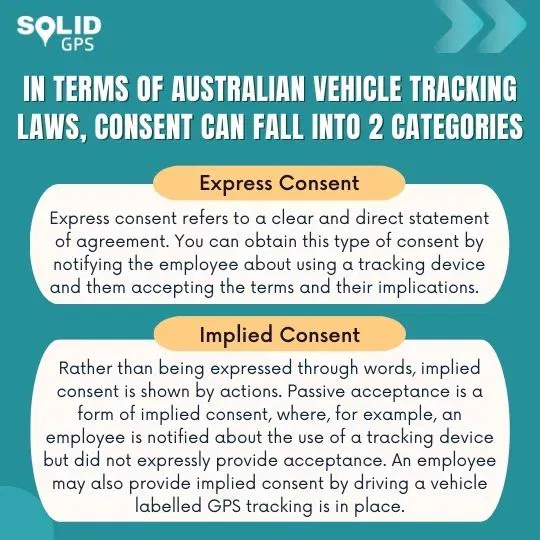
GPS Tracking Laws by State
Each Australian state has its own surveillance laws governing GPS tracking.
Below is a detailed breakdown of how these laws apply.
New South Wales GPS Tracking Laws
New South Wales has some of the strictest GPS tracking laws under the Workplace Surveillance Act 2005 (NSW).
- Employers must provide written notice at least 14 days before surveillance begins.
- The written notice must include:
– The type of tracking (e.g., GPS tracking)
– How the tracking will be conducted
– The duration of the tracking - Employers and employees can agree to a shorter notice period, but it must be in writing.
- Covert surveillance (i.e., tracking without notifying employees) is illegal, with fines of up to $5,000 per offence.
If your business operates in NSW, transparency is essential—employers must clearly communicate tracking details and ensure employees acknowledge the notice.
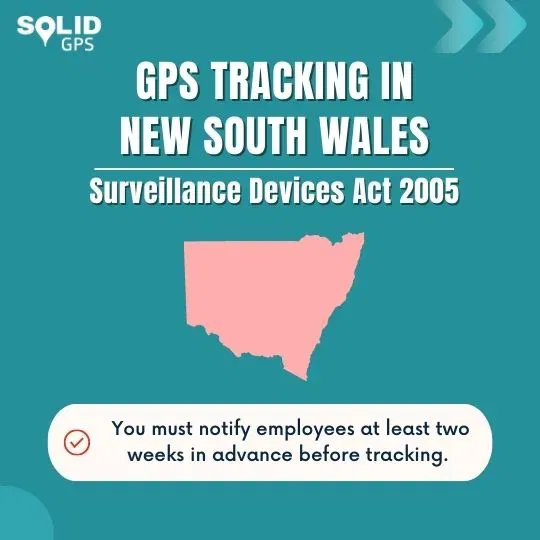
Australian Capital Territory GPS Tracking Laws
The ACT follows laws similar to NSW under the Workplace Privacy Act 2011 (ACT).
- Employers must provide prior notice before implementing tracking.
- The law focuses on transparency—employers must ensure that employees understand the nature of the tracking.
- Failure to comply can result in fines of $5,000 per offence.
Northern Territory GPS Tracking Laws
The Surveillance Devices Act 2007 (NT) governs tracking in the Northern Territory.
- Like NSW and the ACT, consent is required for GPS tracking.
- Employers must ensure employees are fully aware of the tracking device’s purpose and function.
While penalties aren’t explicitly defined in the law, failure to obtain consent could result in legal consequences under privacy laws.
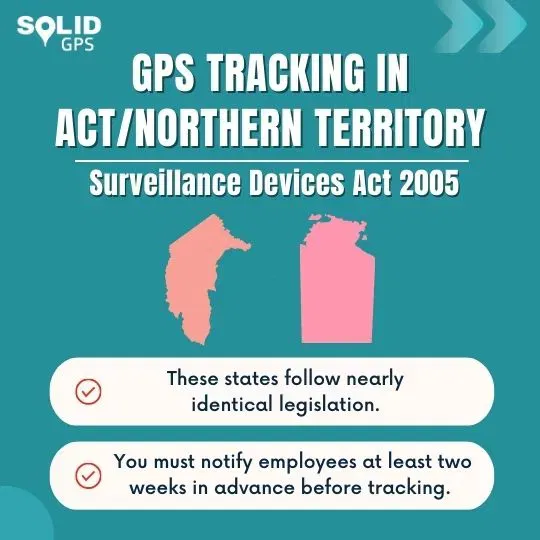
Western Australia GPS Tracking Laws
Western Australia has some of the harshest penalties for illegal GPS tracking under the Surveillance Devices Act 1998 (WA).
- Employers must obtain active consent before tracking employees.
- Simply notifying employees isn’t enough—they must agree to the tracking.
- Failing to comply can result in:
– Fines of up to $50,000 for businesses
– $5,000 fines and/or 12 months in jail for individuals who conduct unauthorised tracking
WA has some of the strictest penalties in Australia, making it critical for businesses to secure explicit written consent before using GPS trackers.
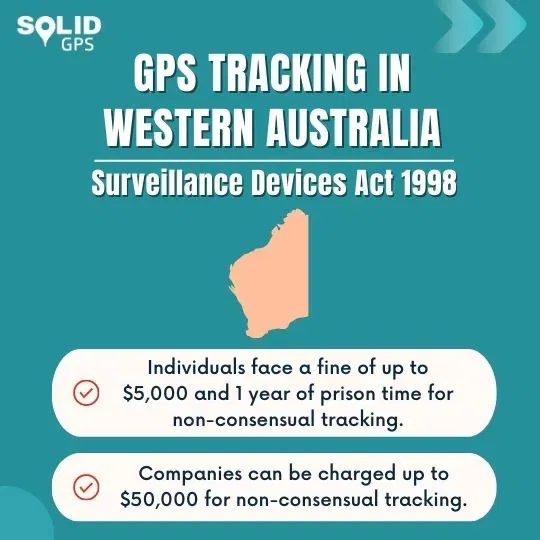
Victoria GPS Tracking Laws
Victoria’s laws fall under the Surveillance Devices Act 1999 (VIC).
- Businesses must obtain consent from employees before installing tracking devices in company vehicles.
- Employers who fail to comply can face:
– Fines of over $230,000 (1200 penalty units) for businesses
– Fines of up to $37,000 or two years in prison for individuals
Employers should ensure that tracking policies are documented and signed by employees to prevent legal risks.
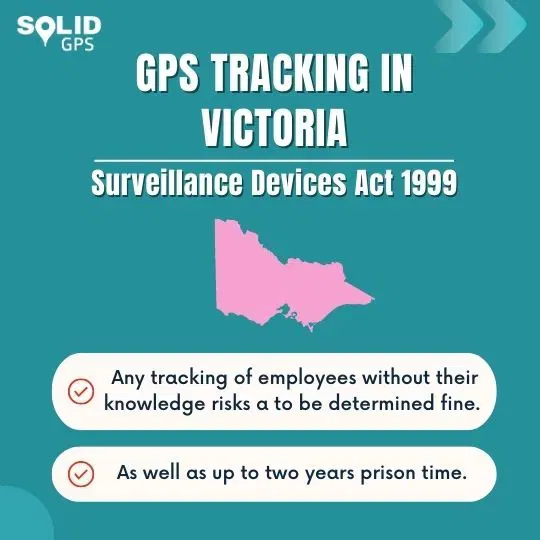
South Australia GPS Tracking Laws
South Australia enforces the Surveillance Devices Act 2016 (SA), emphasising transparency.
- Businesses must inform employees about GPS tracking and obtain consent.
- Breaching SA’s tracking laws can lead to:
– Fines of up to $15,000
– Three years imprisonment for serious violations
Transparency and documentation are essential for businesses operating in SA.
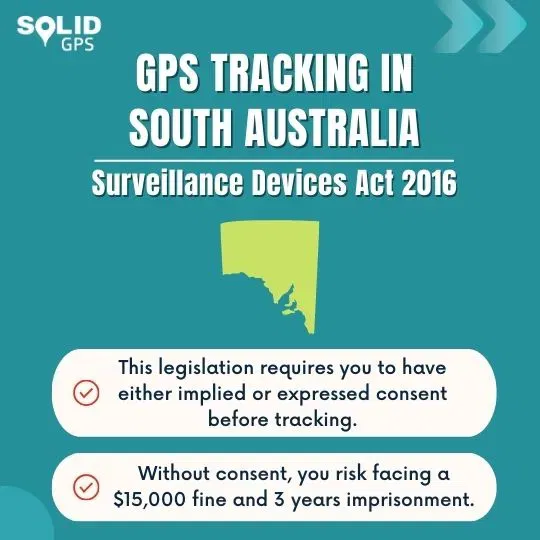
Queensland & Tasmania GPS Tracking Laws
Queensland and Tasmania do not have specific laws governing GPS tracking.
- Without dedicated regulations, businesses in QLD and TAS have more flexibility when implementing tracking.
- However, following best practices—such as obtaining consent—is still recommended to avoid potential privacy disputes.
Although no laws explicitly prohibit GPS tracking, ethical considerations and transparency should guide employer policies.
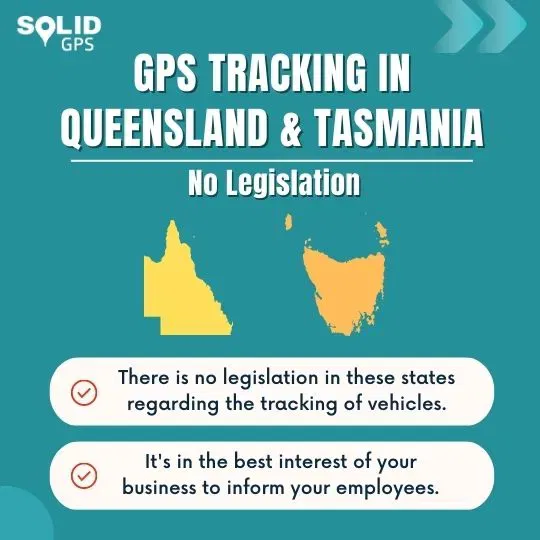
Best Practices for GPS Tracking Compliance
To ensure legal compliance and avoid penalties, businesses should follow these best practices:
- Obtain written consent before installing GPS tracking devices.
- Maintain clear records of consent and notifications.
- Display visible signage indicating that tracking is in place.
- Regularly update tracking policies in line with changing laws.
- Ensure tracking is only used for legitimate business purposes to avoid breaching privacy rights.
By following these steps, businesses can not only comply with Australian GPS tracking laws but also build trust with employees by being transparent and fair.
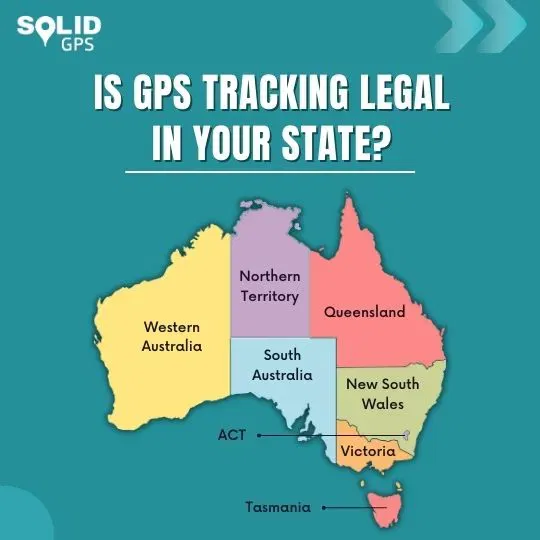
Conclusion
GPS tracking laws in Australia vary by state, with NSW, VIC, WA, and SA requiring written consent, while QLD and TAS currently have fewer specific regulations.
To avoid legal issues, businesses should always inform employees, obtain written agreement, and document consent properly.
Non-compliance can lead to significant fines or even legal consequences.
Want to ensure you’re using GPS tracking legally and effectively? Explore our FAQ section for key insights on compliance and best practices.

